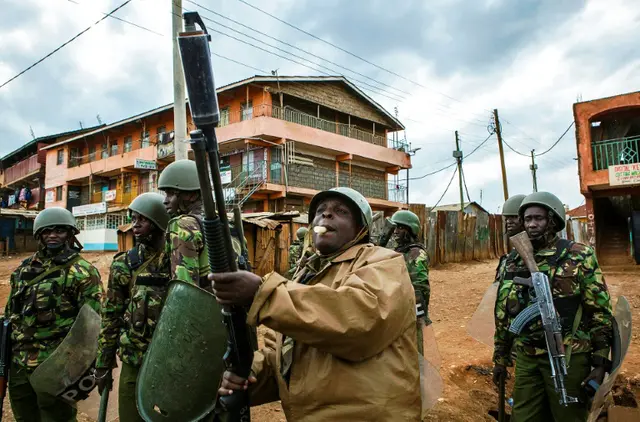Celebrations and riots erupted across Kenya Friday night after President
Uhuru Kenyatta was declared the victor in an election the opposition rejected as
a "charade" after claims of massive rigging.
According to the election commission (IEBC) Kenyatta won the presidential
race with 54.27 percent to rival Raila Odinga's 44.74 in Tuesday's election,
handing him a second term at the helm of east Africa's richest economy.
Angry protests erupted almost immediately in Odinga's strongholds: in
Nairobi's biggest slum Kibera police fired bullets in the direction of
protesters, who looted and attacked businesses they said belonged to Kenyatta
supporters, an AFP photographer said.
In other slum and poor areas around the capital, as well as the western city
of Kisumu, gunshots rang out and protesters lit fires in the street.
The fury from Odinga's supporters came in stark contrast to the cheers from
Kenyatta's camp in his strongholds, with vuvuzelas and cries of joy in the
streets.
The result is a gloomy reminder to Kenyans of the outcome of a disputed 2007
election which led to two months of ethno-political violence that left 1,100
dead and 600,000 displaced.
All eyes will now be on the reaction of Odinga, who has now lost three
elections he claims were stolen from him.
In 2013 the veteran opposition leader took his grievances to court and
lost.
"We have been there before. Court is not an alternative," said top NASA
official James Orengo, slamming the process as a "charade".
After being declared the victor, Kenyatta reached out to Odinga and his
supporters, to "work together... so that we can build this nation together".
Kenyan election results
"We are not enemies. As with any competition there shall always be winners
and there shall be losers but we all belong to one great nation of Kenya," he
said.
"Let us be peaceful... We have seen the results of political violence. And I
am certain that there is no single Kenyan who would wish for us to go back to
this."
Hacking, manipulation
Odinga had called for calm from his supporters before the announcement, but
added: "I don't control anybody. People want to see justice."
The National Super Alliance (NASA) opposition coalition refused to take part
in the announcement of results, which came just hours after they had requested
the IEBC hold off until their concerns had been addressed.
"We are not going to be party to it, our issues have not been addressed,"
said top NASA leader Musalia Mudavadi.
Turnout for Tuesday's vote was 78.91 percent.
Supporters of incumbent Kenyan President Uhuru Kenyatta took to the streets
to celebrate his win
Foreign observers praised a peaceful, credible voting process, but the mood
quickly turned sour when Odinga rejected the results after only a few hours of
counting.
NASA has claimed both that the results were manipulated by a massive hacking
attack, and that it is in possession of results being concealed on IEBC servers
that show Odinga to be the rightful winner.
On Thursday they demanded Odinga be declared president on these grounds.
NASA demanded access to the IEBC's servers, saying they would accept any
result contained therein, as they remain convinced the commission has released
manipulated results.
'Violence not an option'
US Ambassador Bob Godec earlier joined foreign observers in urging parties to
use legal means to deal with their grievances.
"Violence must never be an option. No Kenyan should die because of an
election. Kenya's future is more important than any election. Leaders above all
need to make that clear," Godec said.
Six people have died in election-related violence, including two protesters
in Nairobi shot dead by police on Wednesday.
Before the election the race between Odinga and Kenyatta was seen by
pollsters as too close to call.
It was billed as the final showdown between the two men whose fathers Jomo
Kenyatta and Jaramogi Odinga were allies in the struggle for independence, but
later became bitter rivals, setting the stage for decades of political
rancour.
In his first term, Kenyatta, 55, was credited with a massive infrastructure
drive and overseeing steady economic growth.
However his administration has been dogged by several graft scandals, with
the country dropping six points in Transparency International's corruption index
in 2016.
(AFP)
 简体中文
简体中文

